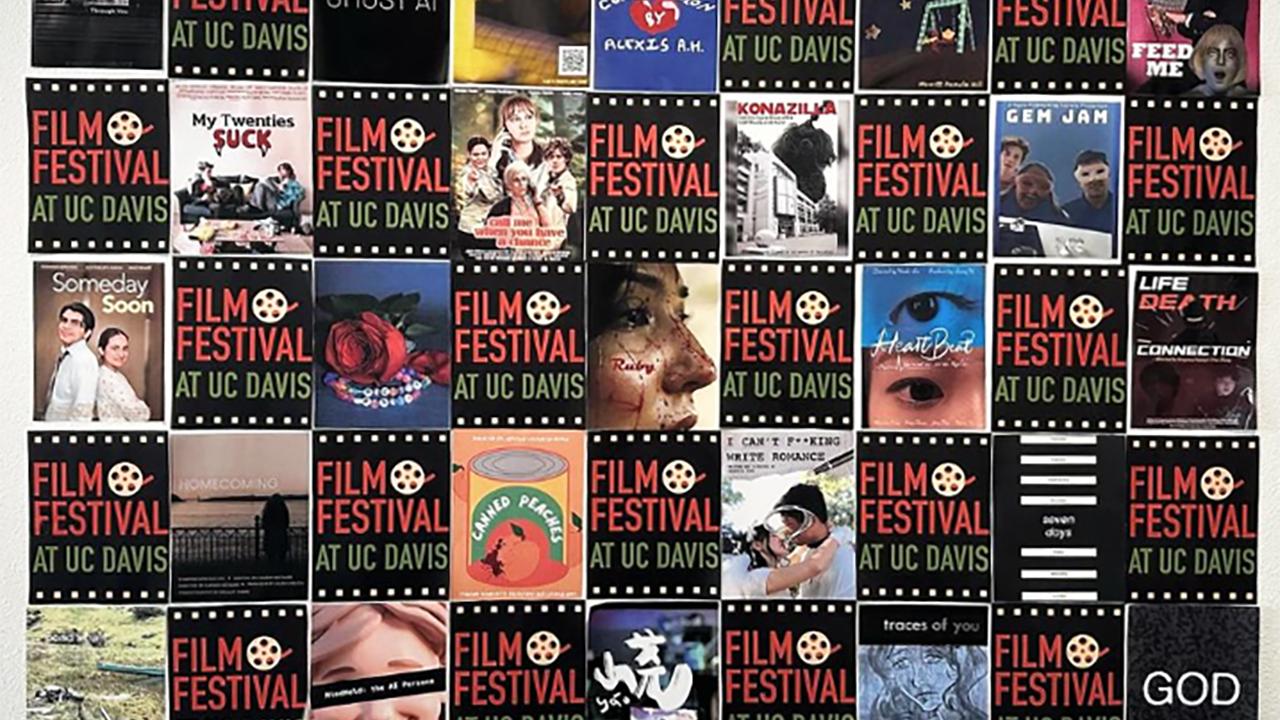
Film Festival Winners Share Their Films
From a three-minute murder fantasy to an eight-minute exploration of what life is like after college for a struggling vampire, the two-dozen student-produced films shown at the most recent Film Festival at UC Davis did not disappoint.
We sat down with several students and recent graduates who took top awards at the festival to learn what inspired them to make their films, what they have to say about their time at UC Davis and what they’re up to next. (Psst... You can view their films below!)
Filmmakers from the start
While some students didn’t start making films until they reached college, others have been reaching for the camera for as long as they can remember. That was the case for Miranda Comstock who started making videos when she was 8-years-old.
“My parents did a lot of home videos and, as a kid, I always tried to grab the camera from them,” she said. “Whenever we were going somewhere I would be recording or make my parents help me put on little skits, it got to the point where I was writing scripts for things to make.”
“I feel like I can’t help making videos of some kind,” she said.
Despite this, Comstock didn’t see filmmaking or video work as a potential career until she was faced with selecting a major on her college application. Not wanting to put “undeclared,” she chose cinema and digital media and stuck with it. At the 2024 Film Festival at UC Davis, Comstock's film, My Twenties Suck, about a young vampire who can't seem to get his life together, won best screenplay.
“Throughout the process I was really worrying about after college life and not wanting to take it too seriously.” — Miranda Comstock, Class of 2024
She thought the idea of a vampire worrying about mundane and very human problems was funny. And, she added, even though the main character — the vampire — isn’t necessarily a great person, he is relatable, as are his problems including struggling to find a job and pay the rent. Comstock graduated this past spring.
Julia Yoko Pearson, an upcoming senior majoring in cinema and digital media, was riding in the car with her grandpa in Oregon when an old bluegrass song, "Ruby, Are You Mad?" came through the speakers. Her imagination followed along to The Osborne Brothers’ 1969 song and, soon after, she had an idea for a short film.
“I thought ‘Oh my gosh, I need to film something with this song over it because I could envision what would be happening and how deranged it would look.” — Julia Yoko Pearson, Class of 2025
Pearson and three of her friends spent part of last summer making the film, Ruby, a slasher fantasy alluding to two different potential realities, both involving a woman giving a man who appears to be a hitchhiker a ride. The projects Pearson gravitates to have female protagonists and what she calls a “feminine energy,” but this was the first time she used violence — and fake blood — in her work.
Pearson won awards for art direction, story and production as well as an audience choice award.
Pearson’s interest in film was fueled by her father, a life-long fan of film, and young creators on social media. Pearson started filming silly videos with her sisters and editing them from her phone when she was 13. Even then, her inspiration was music.
“I really like working off of music,” Pearson said. “A lot of my pieces so far have been very oriented around the music. I think that will show up in my later works.”
Her filmmaker friends tell her she’s in tune with how a song is supposed to feel. She’s had some successful TikTok posts and promoted her film, Ruby, using her account.
This summer, Pearson is re-working one of her earlier films so it can be used as part of her application to film school. The cinema and digital media major is minoring in comparative literature because she sees being a strong writer as being closely tied to being a great filmmaker and storyteller.
A desire longing to be expressed
Merritt Pamela Hill’s first experience making a film was when they were a freshman, taking classes via Zoom in their childhood bedroom. Faced with the choice to write an essay or create a project, Hill proposed making a stop-motion film using Legos that were around the house – something they’d always been interested in doing.
“I just remember being in high school and being told that art was silly and STEM is what mattered, and I just feel so lucky to have kept going and keep reaching and keep doing what I love." — Merritt Pamela Hill, Class of 2024
Starting school during the pandemic, they said, actually helped them get onto the filmmaking and art path.
“I’m grateful I was in a safe environment,” Hill said. “I don’t think I would have started if I had been in a freshman dorm, unfamiliar with my surroundings."
For that first film, Hill remembers taping their iPhone to a lamp as a makeshift tripod and using an app on their phone for filming and editing. Since then, Hill has created four stop-motion films and decided to double major in cinema and digital media and art studio.
“I think those mixed together wonderfully — to learn sculpting to make stop-motion sets and puppets in art studio and, in CDM, learning how to operate software, a camera and editing," they said.
Hill’s idea for this year's film, Keep Reaching, Little Me, an animated stop-motion short, stemmed from a letter they wrote to their younger self as a therapeutic practice. They were also thinking about transitions and how, though they were graduating soon, they were also moving back home.
“Now I’m just back in my childhood bedroom where everything kind of started and I was just thinking about that,” Hill said. They remember telling their therapist, “What if I made a film of little me talking to older me, like two different characters and they need each other to exist?”
Keep Reaching, Little Me won an audience award as well as the award for best animated film.
Hill plans to make Keep Reaching, Little Me into a short series, following along with other sentiments from their letter to themselves. Later this year, Hill will continue their art study in London and Scotland as a recipient of the Manetti Shrem International Residency Scholarship at the Royal Drawing School.
For students, by students
Film Festival at UC Davis, which features all student created work, is run by students in partnership with faculty. It was first established by faculty in the Department of Theatre and Dance in 2000, and has remained a collaboration between students and faculty from art departments within the College of Letters and Science.

For the last two years, the festival has been produced by students in “CDM 189: Where Do Films Go: Film Festivals and Distribution,” which is taught by Associate Professor of Cinema and Digital Media Julie Wyman. Students enrolled in the class get to experience what goes into planning, producing and promoting a film festival.
Alum Jerry Tsai (B.A., cinema and digital media and economics, ‘23), was among the first students to take the course, said the experience was unique and valuable.
"There’s not much opportunity out there to help you understand how a film festival works, even if you go out there and work for a big film fest or volunteer, you only get to know your department,” Tsai said.
By working on a smaller scale, he said, students are aware of what their peers on other teams are doing even if they’re not directly involved.
Film festivals play a crucial role for budding and professional filmmakers alike, giving exposure to new voices, styles and innovations and giving filmmakers an opportunity to network and build community. Wyman, also a filmmaker, said that many of her collaborations have been with people she met at or through film festivals.
"The class is both teaching students what film festivals are and how they work for filmmakers, and it's giving them the opportunity to shape our own UC Davis Film Festival," Wyman said. Each year is a little different and, this year, was the first time there was an alumni jury.
The alumni jury included David Nessl (B.A., technocultural studies, ‘14), who has worked on films such as Finch (2021) and Mufasa: The Lion King (2025); Anna Oh (B.A., film studies and American studies, ‘14), who is now a senior product manager at Fandom, where she leads product development for major platforms like Metacritic, TV Guide and GameSpot; and Jess Philipps (BA, technocultural studies and communication, ‘13), an Emmy-nominated director and documentary filmmaker, and a the showrunner and executive producer for a documentary series covering the black market trade of rhino horn.
The festival is also open to recent graduates and, this year, Tsai won an honorable mention for his film, Yao, A Documentary on 7Kahouso, which is about a local J-Pop band.
Film Festival at UC Davis is co-produced by the UC Davis departments of Art and Art History, Cinema and Digital Media, Design, Music, and Theatre and Dance, which are all part of the College of Letters and Science.
2024 Film Festival Awards:
- Sarah Pia Anderson Directing Award: Amanda Romero (Someday Soon)
- Story: Julia Yoko Pearson (Ruby) and Tatiana Q. Le (Konazilla)
- John Iacovelli Art Direction Award: Julia Yoko Pearson (Ruby)
- Cinematography: Yunlei Liu (Heartbeat)
- Performance / Ensemble Performance: (Konazilla) cast, including Mollie Parenti, Sheryl Lim, Karianyellis Navarro, Colin Johnson, and Kona (dog)
- Editing: Raul C. Huerta (Ghost AI)
- Animation: Merritt Pamela Hill (Keep Reaching, Little Me)
- Jury Award for Creative Vision: Abby O'Sullivan (traces of you)
- Honorable Mention: Jerry Tsai (Yao, a Documentary on 7Kahouso)
- Best Screenplay: Miranda Comstock (My Twenties Suck)
- Audience Awards: Julia Yoko Pearson (Ruby), Tatiana Q. Le (Konazilla), Jillian Munyon (Call Me When You Have a Chance)
YOU MAY ALSO LIKE THESE STORIES

Student Film Explores the Ethical Questions of Artificial Intelligence
Students in this "Experimental Documentary" class were asked to investigate artificial intelligence. "Ghost AI," a film that grew from that assignment, explores ethical questions around its use, specifically when it comes to duplicating someone's likeness, voice or persona.

UC Davis to Launch Artificial Intelligence Center
The National Endowment for the Humanities awarded a $500,000 grant to launch and fund the UC Davis Center for Artificial Intelligence and Experimental Futures (CAIEF). CAIEF will promote the democratic governance of AI systems by engaging diverse stakeholders in processes of creative worldmaking — crafting the world of tomorrow, together.
